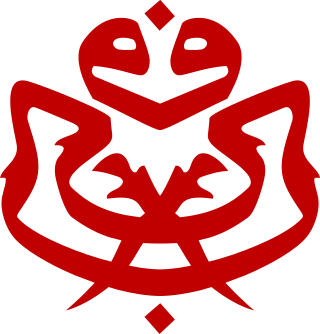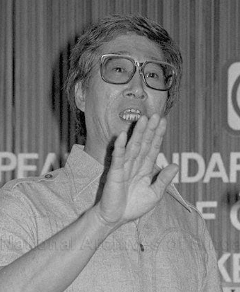Related Research Articles

The People's Action Party (PAP) is a major conservative political party of the centre-right in Singapore. It is one of the three contemporary political parties represented in the Parliament of Singapore, alongside the opposition Workers' Party (WP) and the Progress Singapore Party (PSP).

The United Malays National Organisation (UMNO), officially Pertubuhan Kebangsaan Melayu Bersatu (PEKEMBAR), is a nationalist right-wing political party in Malaysia. As the oldest national political party within Malaysia, UMNO has been known as Malaysia's "Grand Old Party".

The Workers' Party is a major social democratic political party in Singapore and one of the three contemporary political parties represented in Parliament, alongside the governing People's Action Party (PAP) and the other opposition Progress Singapore Party (PSP). The WP sits on the centre-left of the political spectrum and is currently the largest and oldest opposition party in Parliament, having contested every parliamentary election since 1959 against the dominant PAP. Since the 1991 general election, the WP has been the only political party, other than the PAP, with elected Members of Parliament (MPs).

Barisan Sosialis was a political party in Singapore. It was formed on 29 July 1961 and officially registered on 13 August 1961 by left-wing members of the People's Action Party (PAP) who had been expelled from the PAP. The prominent founding members of the Barisan were Lee Siew Choh and Lim Chin Siong. It became the biggest opposition party in Singapore in the 1960s and the 1980s.

PAP–UMNO relations refers to the occasionally turbulent relationship between the People's Action Party (PAP), the governing party of Singapore since 1959, and the United Malays National Organisation (UMNO), the leading party of the Barisan Nasional coalition which governed Malaysia from 1955 to 2018 and has governed it since 2020. The two parties' relationship has impacted Malaysia–Singapore relations given the countries' geographical proximity and close historical ties.

Operation Coldstore was the code name for a covert anti-communist security operation that took place in Singapore on 2 February 1963, which was then an internally self-governing state within the British Empire. It led to the arrest of 113 people, who were detained without trial pursuant to the Preservation of Public Security Ordinance (PPSO).

A referendum on the terms of integration into the Federation of Malaya was held in Singapore on 1 September 1962. There were three options. At the time of the referendum, Singapore was a self-governing country since 1959, although the British Empire still controlled external relations.

General elections were held in Singapore on 21 September 1963, five days after Singapore became part of Malaysia. Voters elected all 51 members of the Legislative Assembly. The elections were the only ones to date with no boundary changes to any existing constituencies prior to the elections. The result was a victory for the People's Action Party (PAP), which won 37 of the 51 seats, while the majority of the remaining seats were won by Barisan Sosialis (BS).

The Singapore People's Alliance was a political coalition in Singapore founded in 1958, comprising the Labour Front and Liberal Socialist Party. It has never won any seats in the Parliament of Singapore. However, the party did win 4 seats to the Singaporean Legislative Assembly in the general election of 1959 under the leadership of former Chief Minister Lim Yew Hock, with a popular vote of 107,755 or 20.7% of the total number of votes. Following the election, the Liberal Socialist Party merged into it.

The 1964 race riots in Singapore involved a series of communal race-based civil disturbances and racially-motivated violence between the Malays and Chinese in Singapore following its merger with Malaysia in 16 September 1963, and were considered to be the "worst and most prolonged in Singapore's postwar history". The term is also used to refer specifically to two riots on 21 July 1964 and 2 September 1964, particularly the former, during which 23 people died and 454 others suffered severe injuries.

Traditionally, women in Singapore played a small role in the country's political scene. Since 1984, Singapore has seen an increase in female representation as more women have run for political office. Notable female politicians include the two former ministers: former Acting Minister for Community Development Seet Ai Mee and former Minister in the Prime Minister's Office Lim Hwee Hua; Minister of State Yu-Foo Yee Shoon; and Amy Khor Lean Suan, a district mayor. Several women also became nominated members of parliament, representing a range of societal interests such as women's groups and conservation groups. On 1 October 2015, Grace Fu was appointed the Minister for Culture, Community and Youth.

General elections were held in Singapore on 30 May 1959. They were held under the new constitution and were the first in which all 51 seats in the Legislative Assembly were filled by election. This was the first election victory for the People's Action Party (PAP), as they won a landslide victory with 43 seats. The party has remained in power ever since.

The self-governance of Singapore was carried out in several stages. Since the founding of Singapore in 1819, Singapore had been under the colonial rule of the British. The first local elections on a limited scale for several positions in the government of Singapore started in 1948 following an amendment to the Constitution of Singapore.
The by-election was held on 10 July 1965, with the nomination day held on 30 June 1965. Legislative Assembly member and chief of United People's Party Ong Eng Guan resigned his seat, precipitating a by-election for the Hong Lim Constituency. This is the last by-election for the Legislative Assembly prior to Singapore's expulsion from Malaysia and its independence.
Sandrasegaran "Sidney" Woodhull was a Singaporean lawyer, former politician and political prisoner. He was a founding member of the University of Malaya's University Socialist Club, and the Singapore's political parties, People's Action Party and the Barisan Sosialis.
Chan Choy Siong was a Singaporean politician and women's rights activist. Chan was one of the first women to be elected to the Parliament.

Inche Mohamed Sidik bin Haji Abdul Hamid, commonly known as Inche Sidik, was a Singaporean politician. He was a member of Malay Union before he left in 1957 and joined the Singapore branch of the United Malays National Organisation (UMNO). He was the Member of Parliament (MP) representing Southern Islands Constituency from 1955 to 1959. He also served as the Assistant Education Minister.

Andrew Fong Sip Chee, PJG was a Singaporean former politician. A member of the People's Action Party (PAP), Fong served as the Minister of State for Culture from 1981 to 1985, the Member of Parliament (MP) representing Stamford Constituency from 1963 to 1976, and the MP representing Kampong Chai Chee Constituency from 1977 to 1988.

Felice Leon-Soh was a politician and social worker in Singapore. Initially a school principal, she was elected a member of the City Council of Singapore representing Mountbatten as a member of the Liberal Socialist Party (LSP) in 1957. She left the party at the start of 1959 due to a dispute. She then continued in the council as an independent for a few months before resigning to contest in the 1959 Singaporean general election as the president of the Katong United Residents' Association (KURA).

Chan Chee Seng was a Singaporean former politician. A former member of the People's Action Party (PAP), he served as the Member of Parliament (MP) representing Jalan Besar Constituency from 1959 to 1984 and the Party Whip of the People's Action Party from 1963 to 1968.
References
- 1 2 "Siglap people have choice of seven candidates". The Straits Times . Singapore. 28 May 1959. Retrieved 9 September 2024.
- 1 2 3 4 5 6 7 8 9 10 11 12 13 Rasheed, Zainul Abidin; Saat, Norsharil; Zoohri, Hussin (2020). Beyond Bicentennial: Perspectives On Malays. World Scientific. pp. 613–637. ISBN 9789811212529.
- ↑ "12 MORE QUIT COLONY UMNO". The Straits Budget . Singapore. 29 January 1958. Retrieved 9 September 2024.
- ↑ Ubaidillah, Ustaz Ahmad (4 August 2021). "5 Muslim Pioneers of Singapore and Their Contributions". muslim.sg. Majlis Ugama Islam Singapura . Retrieved 9 September 2024.
- ↑ "Assemblywoman takes over". The Straits Times . Singapore. 24 June 1959. Retrieved 9 September 2024.
- ↑ Ghim, Phyllis. "The Singapore Council of Women and the Women's Movement". Journal of Southeast Asian Studies . 25 (1): 136. doi:10.1017/S0022463400006706 . Retrieved 6 September 2024.
- ↑ "'Equal pay for women' call". The Straits Times . Singapore. 15 November 1961. Retrieved 9 September 2024.
- ↑ Ng, Keng Gene (19 December 2022). "PAP might have lost battle with pro-communists if not for ex-MP Chan Chee Seng: PM Lee". The Straits Times . Singapore. Retrieved 9 September 2024.
- ↑ "Impossible conditions put forward by Barisan Sosialis: Goh". The Straits Times . Singapore. 25 November 1961. Retrieved 9 September 2024.
- ↑ "Assemblywoman opens school". The Straits Times . Singapore. 27 June 1963. Retrieved 9 September 2024.
- ↑ "Raja hits at ward switching by MCA candidate". The Straits Times . Singapore. 8 April 1964. Retrieved 9 September 2024.
- ↑ Leong, Weng Kam (3 June 2001). "High drama in last-minute vote". The Straits Times . Singapore.
- ↑ Leong, Weng Kam (9 September 2001). "Why I quit PAP". The Straits Times . Singapore.
- ↑ Baptista, Esme (1 May 1959). "Watch these nine women: They're out to woo thousands". The Straits Times . Singapore. Retrieved 13 September 2024.
- ↑ "Che Norma Yahya jadi wanita Melayu tunggal dalam pilehan roya ini". Berita Harian . Singapore. 20 August 1972. Retrieved 9 September 2024.